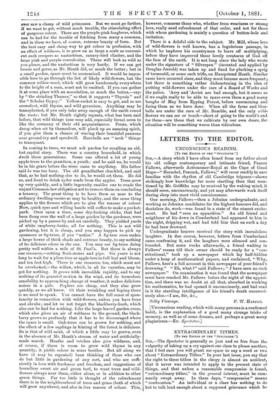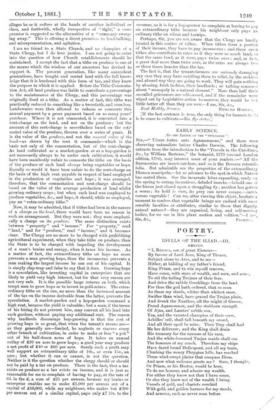EXTRAORDINARY TITHES.
[To THE EDITOR OF THE " SPECTATOR:] SLR,—The Spectator is generally so just and so free from the vulgarity of taking up a cry against one class to please another, that I feel sure you will grant me space to say a word or two about "Extraordinary Tithes." In your last issue, you say that the right to these tithes in the clergy is almost an accident, that it never was intended to apply to the present state of things, and that unless a reasonable compromise is found, "extraordinary tithes," in the general interest, must be sum- marily swept away. In these days, " compromise " means "confiscation." An individual or a class has nothing to do but to talk loud enough about a supposed grievance which he
alleges he or it suffers at the hands of another individual or class, and forthwith, wholly irrespective of "right," a com- promise is suggested as the alternative of a "summary sweep- ing away." This is offering a direct premium to loud-talking, and misrepresentation, and agitation.
I am no friend to a State Church, and no champion of a State Clergy, but I do love justice. I am not going to cuter into the question of how Church establishments should be maintained. I accept the fact that a tithe on produce is one of the means which the wisdom of our ancestors has devised to support it. The present generation, like many antecedent generations, have bought and rented land with the full know- ledge that it is burdened with this form of tax, and they know the purpose to which it is applied. Before the Tithe Commuta- tion Act, all land produce was liable to contribute a per-centage to the maintenance of the Clergy, and this per-centage was originally fixed at a tithe. As a matter of fact, this tithe was practically reduced to something like a twentieth, and even less. Landowners were then allowed to redeem or commute this annual payment by a gross payment based on so many years' purchase. Where it is not commuted, it is converted into a rent-charge on the land, and not on the produce ; but the amount of this rent-charge is nevertheless based on the esti- mated value of the produce, thrown over a series of years. It is the value of the produce, and not the annual value of the land—as shown by the rent it commands—which is the basis not only of the commutation, but of the rent-charge. As land cultivated as a market-garden or as a hop-garden is not necessarily always to be under such cultivation, it would have been manifestly unfair to commute the tithe on the basis of the produce of such land always being vegetables or hops. Equally so would it have been unfair to fix the rent-charge on the basis of the high rent payable in respect of land employed in the production of vegetables and hops ; it was arranged, therefore, that the commutation and rent-charge should be based on the value of the average production of land whilst growing ordinary crops ; but when such land was employed to produce vegetables, &c., and hops, it should, while so employed, pay an "extra-ordinary tithe."
Now, it may be admitted, that if tithes had been in the nature of a charge on the land, there would have been no reason in such an arrangement. But they were not ; they were emphati- cally a charge on its produce. The same distinction exists between "property" and " income." For "property," read "land," and for "produce," read "income," and it becomes clear. The Clergy are no more to be charged with prohibiting agricultural experiment, when they take tithe on produce, than the State is to be charged with impeding the development of a man's brains and energy, when it taxes his income. As a matter of fact, the extraordinary tithe on hops no more prevents a man growing hops, than the income-tax prevents a man making the largest income he can out of his capital. It is simply clap-trap and false to say that it does. Growing hops is a speculation, like investing capital in enterprises that are likely to yield very high interest, but for that very reason are not very safe. It is the possible large returns on both, which tempt men to grow hops or to invest in gold-mines. The extra- ordinary tithe on the one, no more than the increased amount of the tax on the income derivable from the latter, prevents the speculation. A market-garden and a hop-garden command a high rent, because the yield is valuable ; but a man, if the terms of his hiring do not prevent him, may convert all his land into such gardens, without paying any additional rent. The reason why landlords discourage hop-growing is that the cost of growing hops is so great, that when the tenant's means are- as they generally are—limited, he neglects or starves every other branch of cultivation, in order to make or lose "a pot" out of his half-dozen acres of hops. It takes an annual outlay of £20 an acre to grow hops ; a good year may produce a net profit of £40 or £60 per acre. Surely such a profit may well support an extraordinary tithe of 10s., or even 15s., an acre ; but whether it can or cannot, is not the question. Neither is it the question whether the clergy should or should not be paid by a tax on produce. There is the fact, that a tax exists on produce as a tax exists on income, and it is just as reasonable for me to complain of having to pay, at the rate of 6d. in the A a sum of £25 per annum, because my brains or enterprise enables me to -make £1,000 per annum out of a capital of £10,000, while my neighbour, who makes but £300 per annum out of a similar capital, pays only £7 10s. to the
revenue, as it is for a hop-grower to complain at having to pay an extraordinary tithe because his neighbour only pays an ordinary tithe on wheat and turnips.
Perhaps, Sir, you are not aware that the Clergy are hardly treated in this matter of tithes. When tithes form a portion of their income, they have to pay income-tax ; and these same tithes also contribute to rates as if they were so much land, so that the same fund, as it were, pays twice over ; and, in fact, a great deal more than twice over, as the rates are always two or three times heavier than the tax.
The fact is, that the tenant-farmers are seriously damaging any case they may have entitling them to relief, by the reckless and absurd way they are going to work. They will gain nothing by abusing, Irish fashion, their landlords ; or talking nonsense about "monopoly in a natural element." More than half their so-called grievances are self-caused, and if the remainder were wiped out by Legislative action to-morrow, they would be but little better off than they are now.—I am, Sir, &c.,
East Hothly, Sus.se.4:. EDMUND HoRNIii. If the last sentence is true, the only thing for farmers to is to cease to cultivate.—En. Sp,etator.]































 Previous page
Previous page